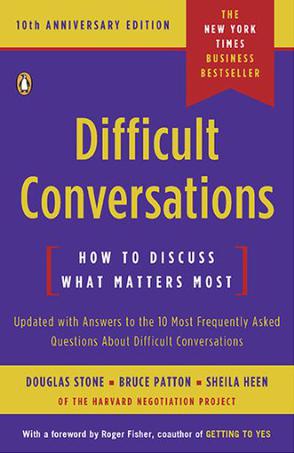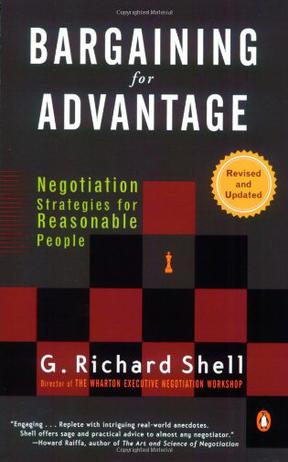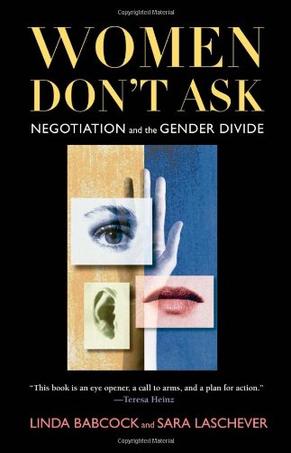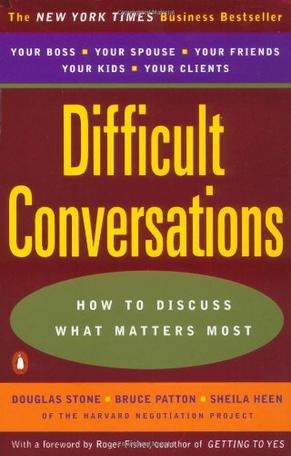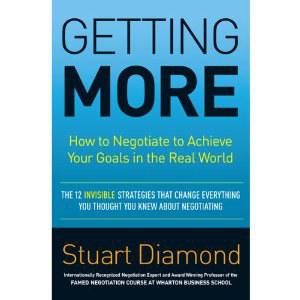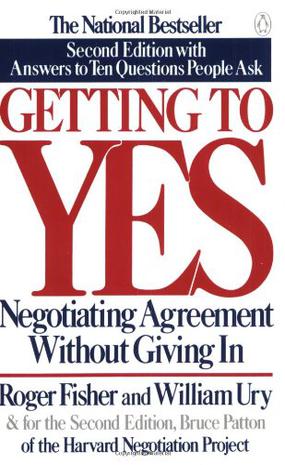欢迎来到相识电子书!
标签:Negotiation
-
Difficult Conversations
The 10th-anniversary edition of the New York Times business bestseller-now updated with "Answers to Ten Questions People Ask" We attempt or avoid difficult conversations every day-whether dealing with an underperforming employee, disagreeing with a spouse, or negotiating with a client. From the Harvard Negotiation Project, the organization that brought you Getting to Yes, Difficult Conversations provides a step-by-step approach to having those tough conversations with less stress and more success. you'll learn how to: • Decipher the underlying structure of every difficult conversation • Start a conversation without defensiveness • Listen for the meaning of what is not said • Stay balanced in the face of attacks and accusations • Move from emotion to productive problem solving -
Bargaining for Advantage
在线阅读本书 The award-winning guide to business negotiation used by top negotiators and training programs all over the worldcompletely updated and revised As director of the renowned Wharton Executive Negotiation Workshop, Professor G. Richard Shell has taught thousands of business leaders, administrators, and other professionals how to survive and thrive in the sometimes rough-and-tumble world of negotiation. His systematic, step- by-step approach comes to life in this book, which is available in over ten foreign editions and combines lively storytelling, proven tactics, and reliable insights gleaned from the latest negotiation research. This updated edition includes: A brand-new Negotiation I.Q. test designed by Shell and used by executives at the Wharton workshop that reveals each readers unique strengths and weaknesses as a negotiator A concise manual on how to avoid the perils and pitfalls of online negotiations involving e-mail and instant messaging A detailed look at how gender and cultural differences can derail negotiations, and advice for putting talks back on track -
Women Don't Ask
When Linda Babcock asked why so many male graduate students were teaching their own courses and most female students were assigned as assistants, her dean said: "More men ask. The women just don't ask." It turns out that whether they want higher salaries or more help at home, women often find it hard to ask. Sometimes they don't know that change is possible--they don't know that they can ask. Sometimes they fear that asking may damage a relationship. And sometimes they don't ask because they've learned that society can react badly to women asserting their own needs and desires. By looking at the barriers holding women back and the social forces constraining them, "Women Don't Ask" shows women how to reframe their interactions and more accurately evaluate their opportunities. It teaches them how to ask for what they want in ways that feel comfortable and possible, taking into account the impact of asking on their relationships. And it teaches all of us how to recognize the ways in which our institutions, child-rearing practices, and unspoken assumptions perpetuate inequalities--inequalities that are not only fundamentally unfair but also inefficient and economically unsound. With women's progress toward full economic and social equality stalled, women's lives becoming increasingly complex, and the structures of businesses changing, the ability to negotiate is no longer a luxury but a necessity. Drawing on research in psychology, sociology, economics, and organizational behavior as well as dozens of interviews with men and women from all walks of life, "Women Don't Ask" is the first book to identify the dramatic difference between men and women in their propensity to negotiate for what they want. It tells women how to ask, and why they should. -
Difficult Conversations
Members of the Harvard Negotiation Project--which brought you the mega-bestseller Getting to YES --show you how to handle your most difficult conversations with confidence and skill. Whether you're dealing with an underperforming employee, disagreeing with your spouse about money or child-rearing, negotiating with a difficult client, or simply saying "no," or "I'm sorry," or "I love you," we attempt or avoid difficult conversations every day. Based on fifteen years of research at the Harvard Negotiation Project, Difficult Conversations walks you through a step-by-step proven approach to having your toughest conversations with less stress and more success. You will learn: how to start the conversation without defensiveness why what is not said is as important as what is ways of keeping and regaining your balance in the face of attacks and accusations how to decipher the underlying structure of every difficult conversation Filled with examples from everyday life, Difficult Conversations will help you on the job, at home, or out in the world. It is a book you will turn to again and again for advice, practical skills, and reassurance. "Does this book deliver on [its] promise of an effective way through sticky situations, whether 'with your baby sitter or your biggest client'? It does."-- The New York Times "These talented communicators blend a daunting array of disciplines into highly readable and practical advice."-- Booklist "Brilliant. . . . I've already re-read most of it. I'm using it. What more could a reader ask?"-- Tom Peters "Emotional Intelligence applied to life's tough moments."-- Daniel Goleman -
Getting More
Negotiation is part of every human encounter, and most of us do it badly. Whether dealing with family, a business or diplomacy, people often fail to meet their goals in every country and context. They focus on power and “win-win” instead of relationships and perceptions. They don’t find enough things to trade. They think others should be rational when they should be dealing with emotions. They get distracted from their goals. In this revolutionary book, leading negotiation practitioner and professor Stuart Diamond draws on the research and practice of 30,000 people he has taught and advised in 45 countries over two decades to outline specific, practical and better ways to deal with others. They range from country and corporate leaders to administrative assistants, lawyers, housewives, students and laborers. To this he adds his 40-year experience as an executive, Harvard-trained attorney and Pulitzer Prize winning journalist. Getting More is based on Professor Diamond’s award-winning negotiations course at The Wharton Business School, where it has been the most sought-after course by students for 13 years. It contains a powerful toolkit that can be used by anyone in any situation: with kids and jobs, travel and shopping, business, politics, relationships, cultures, partners and competitors. The advice is addressed through the insightful stories of hundreds of people who have used Diamond’s tools with great success. A 20% savings on an item already on sale. An extra $300 million profit in a business. A woman from India getting out of her own arranged marriage. A 4 year old willingly brushing his teeth and going to bed. Conventional wisdom is challenged on almost every page. Instead of “win-win,” it sometimes makes more sense lose today to get more tomorrow. The use of power, Diamond cautions, too often causes retaliation, harms relationships and costs credibility. Walking out is almost never as good as understanding the other person’s perceptions and fixing the problem. Not everything is about money; intangibles such as valuing others will often get you much more in return. Even the hardest bargainers can be tamed by using their own public standards against them. The key to getting more is finding the right tools for each situation; being more flexible, and better understanding the other party. These strategies are invisible, until you learn them. Once you see them, they will always be there to help you get more . -
Getting to Yes
This is by far the best thing I've ever read about negotiation. It is equally relevant for the individual who would like to keep his friends, property, and income and the statesman who would like to keep the peace. --John Kenneth Galbraith.
热门标签
下载排行榜
- 1 梦的解析:最佳译本
- 2 李鸿章全传
- 3 淡定的智慧
- 4 心理操控术
- 5 哈佛口才课
- 6 俗世奇人
- 7 日瓦戈医生
- 8 笑死你的逻辑学
- 9 历史老师没教过的历史
- 10 1分钟和陌生人成为朋友

